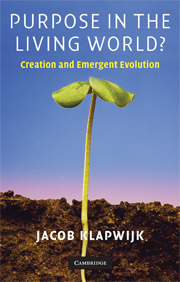Book contents
- Frontmatter
- Contents
- List of figures
- Preface
- Introduction
- 1 Does life on earth have a purpose?
- 2 Creationism, Intelligent Design, and Augustine's idea of time
- 3 Darwin, neo-Darwinism, and the naturalistic continuity claim
- 4 Miller's pre-biotic broth and the premises of evolutionism
- 5 A cold shudder along Darwin's back
- 6 The emergence theory of Morgan and Alexander
- 7 Luctor et emergo: what is emergent evolution?
- 8 Toward a general theory of emergent evolution
- 9 Hominization and the philosophy of mind
- 10 Augustinian faith and evolutionary science
- 11 The organism is a whole. The world is a habitat
- 12 The slumbering temptation of essentialism
- 13 Questions surrounding the emergence process
- 14 Enkapsis in nature. Is there an Omega point?
- Bibliography
- Index
4 - Miller's pre-biotic broth and the premises of evolutionism
Published online by Cambridge University Press: 05 June 2012
- Frontmatter
- Contents
- List of figures
- Preface
- Introduction
- 1 Does life on earth have a purpose?
- 2 Creationism, Intelligent Design, and Augustine's idea of time
- 3 Darwin, neo-Darwinism, and the naturalistic continuity claim
- 4 Miller's pre-biotic broth and the premises of evolutionism
- 5 A cold shudder along Darwin's back
- 6 The emergence theory of Morgan and Alexander
- 7 Luctor et emergo: what is emergent evolution?
- 8 Toward a general theory of emergent evolution
- 9 Hominization and the philosophy of mind
- 10 Augustinian faith and evolutionary science
- 11 The organism is a whole. The world is a habitat
- 12 The slumbering temptation of essentialism
- 13 Questions surrounding the emergence process
- 14 Enkapsis in nature. Is there an Omega point?
- Bibliography
- Index
Summary
To gain clarity in the discussion on origins, we distinguished in the previous chapter between evolution theory and evolutionism. There is, on the one hand, evolution theory as a strictly scientific analysis of the evolution process, a cluster of theories about the descent of biological species. On the other hand, there is evolutionism as the elevation of these theories to an ideological complex, a worldview of naturalistic character. Also this ideological edifice is often designated as “evolution theory” but it rests on pre-theoretical foundations. It offers naturalistic explanations, in the first place for the origin of life on earth (section 1), then for the development of all lower and higher life forms (section 2), and finally for the unfolding of Homo sapiens in the direction of human culture, morals, and science (section 3). In this chapter let us, using the work of Stanley Lloyd Miller as a starting-point, examine these naturalistic explanations on their scientific merits. They appear to be affected by problematic premises.
ORIGIN OF LIFE: A CATEGORY MISTAKE
Did inanimate nature originate life on earth entirely by its own means? That chemical chaos, typical of the young earth, gave rise to life – in the form of unicellular micro-organisms – and that in a completely random and unordered manner, has never been proven scientifically. Some scientists even reject this option completely. On August 6, 1996, NASA announced with great fanfare that a meteorite from Mars, found in Antarctica, contained the fossil remains of bacteria.
- Type
- Chapter
- Information
- Purpose in the Living World?Creation and Emergent Evolution, pp. 53 - 70Publisher: Cambridge University PressPrint publication year: 2008

